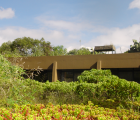
INTRODUCTION: In the first months of 2016, the Mexico City Metropolitan Area experienced the worst air pollution crisis in the last decade, prompting drastic short-term solutions by the Mexico City Government and neighboring States. In order to help further the search for long-term sustainable solutions, we felt obliged to immediately release the results of our research regarding the monitoring of carbon sequestration by green roofs. Large-scale naturation, such as the implementation of green roofs, provides a way to partially mitigate the increased carbon dioxide output in urban areas.
METHODS: Here, we quantified the carbon sequestration capabilities of two ornamental succulent plant species, Sedum dendroideum and Sedum rubrotinctum, which require low maintenance, and little or no irrigation. To obtain a detailed picture of these plants’ carbon sequestration capabilities, we measured carbon uptake on the Sedum plants by quantifying carbon dioxide exchange and fixation as organic acids, during the day and across the year, on a green roof located in Southern Mexico City.
RESULTS: The species displayed their typical CAM photosynthetic metabolism. Moreover, our quantification allowed us to conservatively estimate that a newly planted green roof of Sedum sequesters approximately 180,000,000 ppm of carbon dioxide per year in a green roof of 100 square meters in the short term.
DISCUSSION: The patterns of CAM and carbon dioxide sequestration were highly robust to the fluctuations of temperature and precipitation between seasons, and therefore we speculate that carbon sequestration would be comparable in any given year of a newly planted green roof. Older green roof would require regular trimming to mantain their carbon sink properties, but their carbon sequestration capabilities remain to be quantified. Nevertheless, we propose that Sedum green roofs can be part of the long-term solutions to mitigate the air pollution crisis in the Mexico City Metropolitan area, and other “megacities” with marked seasonal drought.
